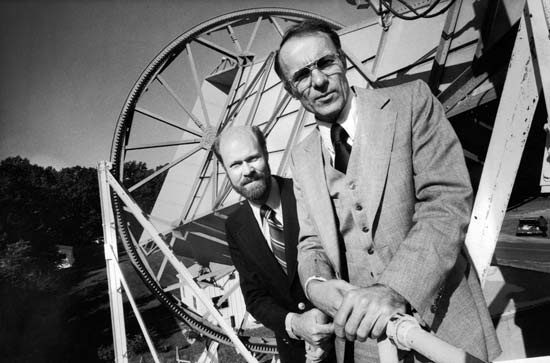Wilson, Robert Woodrow
American astronomer
born January 10, 1936, Houston, Texas, U.S.
 American radio astronomer who shared, with Arno Penzias (Penzias, Arno), the 1978 Nobel Prize for Physics for a discovery that supported the big-bang model of creation. (Soviet physicist Pyotr Leonidovich Kapitsa (Kapitsa, Pyotr Leonidovich) also shared the award, for unrelated research.)
American radio astronomer who shared, with Arno Penzias (Penzias, Arno), the 1978 Nobel Prize for Physics for a discovery that supported the big-bang model of creation. (Soviet physicist Pyotr Leonidovich Kapitsa (Kapitsa, Pyotr Leonidovich) also shared the award, for unrelated research.)Educated at Rice University in Houston and the California Institute of Technology in Pasadena, where he received his doctorate in 1962, Wilson then worked (1963–76) at the Bell Telephone Laboratories at Holmdel, New Jersey, where, in collaboration with Penzias, he began monitoring radio emissions from a ring of gas encircling the Milky Way Galaxy. The two scientists detected an unusual background radiation that seemed to permeate the cosmos uniformly and indicated a temperature of 3 kelvins (three degrees above absolute zero). This radiation appeared to be a remnant of the big bang, the primordial explosion billions of years ago from which the universe originated.
From 1976 Wilson was head of Bell's Radio Physics Research Department. He contributed to many scientific journals on such subjects as background-temperature measurements and millimetre-wave measurements of interstellar molecules. He became a member of the U.S. National Academy of Science in 1979.
- Fröhlich's syndrome
- Frýdek-Místek
- F. Scott Fitzgerald
- F.S. Flint
- F. Sherwood Rowland
- FTP
- F.T. Prince
- fu
- Fuad Chehab
- Fuad Paşa, Mehmed
- Fu'an
- fubing system
- Fuchsia
- Fuchs, Klaus
- Fuchs, Leonhard
- Fuchs, Ruth
- Fuchs, Sir Vivian Ernest
- Fuchun River
- Fuchū
- Fucino Basin
- Fucus
- fudge
- Fudō Myō-ō
- fuel cell
- fuel injection